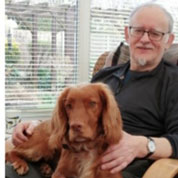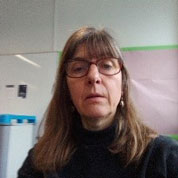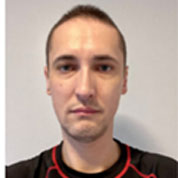The PERFORM trial
Patient Advisory Group
 What is the Patient Advisory Group?
What is the Patient Advisory Group?
The PERFORM Patient Advisory Group (PAG) members help to shape every part the PERFORM research programme.
PAG members offer their guidance on how the research could be developed and delivered, including sharing of outcome from research into practice. This is an important part of making sure research we do is relevant to people’s health and care needs with multiple long-term conditions.
Meet our group
Paul Ashby
 I joined the Civil Service aged nineteen and having worked my way through the ranks, spent the last fifteen years of my career as an Official Receiver, my last posting being in Birmingham. Shortly prior to my retirement in 2011, I was diagnosed with chronic lymphocytic leukaemia and have been on a “watch and wait” programme ever since. Additionally I have osteonecrosis, have had a knee replacement and a heart bypass. Following on from the heart bypass, some five years ago, I joined a PPI group operating out of Glenfield, Leicester. I am also the non academic member of the PERFORM Steering Board.
I joined the Civil Service aged nineteen and having worked my way through the ranks, spent the last fifteen years of my career as an Official Receiver, my last posting being in Birmingham. Shortly prior to my retirement in 2011, I was diagnosed with chronic lymphocytic leukaemia and have been on a “watch and wait” programme ever since. Additionally I have osteonecrosis, have had a knee replacement and a heart bypass. Following on from the heart bypass, some five years ago, I joined a PPI group operating out of Glenfield, Leicester. I am also the non academic member of the PERFORM Steering Board.
Samina Begum
I became involved with patient public involvement and engagement (PPIE) after being invited to an initial meeting by a colleague with researchers in Born in Bradford research over 3 years ago. I was able to offer my opinions and views on various research such as air pollution, children's outcomes in deprived areas and access to dentist services.
As a carer, I was able to advocate for services and get involved in co-production from the lived experience perspective, review documents and work as a peer researcher in the local community.
Firoza Davies

My name is Firoza Davies and I am a 45 year old South Asian female living with multi morbidity. I have physical and mental health conditions and I am neurodiverse. I am a florist who no longer works due to ill-health.
Being a part of research is so important to me from an EDI perspective because people of colour generally shy away from anything research-related. There is too much stigma which needs to get change IMHO.
Being involved in PPI and PPIE has changed my life for the better. I encourage anyone and everyone to get involved .
Clara De Barros
I was diagnosed autistic as an adult, and I am a firm and passionate advocate for autistic people's rights in society. I give autism training to professionals. I am a member of the first Covid-19 Public Research Panel. Introducing the Covid-19 public research panel, ARC South London. I have been involved in research trials during their development as a co-applicant; identifying priorities, commenting and developing research materials, undertaking interviews with research participants, writing lay summaries, sitting on committees and boards, reviewing documents, and research applications.
Andrew Freeman
 Most of my professional life had been in health care, pharmaceuticals, and medical device companies. In 2000, I was diagnosed with Diabetes TI at the age of 31 without being overweight or having a family history of diabetes. By 2017 my renal function was in decline, and I had a kidney and pancreas transplant in 2019. I am now involved with projects for patients and their families and friends, improving clinical pathways with GPs, clinicians, primary care networks and integrated care boards. As a brand ambassador for Kidney Research UK, and a Research champion for NIHR SW London, I am aware that lots of issues are connected with long term conditions.
Most of my professional life had been in health care, pharmaceuticals, and medical device companies. In 2000, I was diagnosed with Diabetes TI at the age of 31 without being overweight or having a family history of diabetes. By 2017 my renal function was in decline, and I had a kidney and pancreas transplant in 2019. I am now involved with projects for patients and their families and friends, improving clinical pathways with GPs, clinicians, primary care networks and integrated care boards. As a brand ambassador for Kidney Research UK, and a Research champion for NIHR SW London, I am aware that lots of issues are connected with long term conditions.
Dorothy Grace Elder
I founded the Scottish Parliament’s cross party group on chronic pain 21 years ago as a member of the first Scottish Parliament and have remained with it long after leaving parliament (now voluntary secretary).
Chronic conditions are pushed to the bottom of health priorities in many countries, leaving a multitude in serious pain with little help. Untreated chronic conditions are a huge part of the UK’s social and economic problems. They can crush families, cause mental and physical suffering, job loss and for some, poverty. I developed rheumatoid arthritis and osteoporosis in recent years – long after campaigning!
Rashmi Kumar
Caring for a family member suffering from long-term multiple conditions, CVD, COPD and now kidney failure: these responsibilities have made me understand some key physical, psychological and social challenges patients (and families) face in their lives everyday, and how with little support, health and quality of wellbeing can be significantly improved.
I am from South East England with significant health, cultural and socio-economic diverse communities, many experiencing and living with multiple health and care deprivation, social isolations and poor mental health support. I have participated and contributed as co-applicant on some research studies for improvements of health and care services.
Rebecca Longley
 My career has been guided by the principles of equality, co-operation, self management and self-development. I have worked mainly in the field of disability for a variety of organisations: HE, statutory, voluntary, service user controlled, and have been self-employed. I have epilepsy, and other long term health conditions. I have extensive PPI experience.
My career has been guided by the principles of equality, co-operation, self management and self-development. I have worked mainly in the field of disability for a variety of organisations: HE, statutory, voluntary, service user controlled, and have been self-employed. I have epilepsy, and other long term health conditions. I have extensive PPI experience.
Kamil Sterniczuk
 I trained as a Teacher of English as a Foreign Language (TOEFL) and have always like trying new things. After my first liver transplant (due to incurable autoimmune disease), I wanted to give back to the hospital for the care I had been receiving. An opportunity presented itself, when a PPI group was looking for people with lived experience of disease. I joined and started contributing to studies and group meetings. At first, I would only read and comment on documents for patients. Eventually, I spoke at conferences, commented on protocols for studies, was a lay co-applicant and co-author of papers.
I trained as a Teacher of English as a Foreign Language (TOEFL) and have always like trying new things. After my first liver transplant (due to incurable autoimmune disease), I wanted to give back to the hospital for the care I had been receiving. An opportunity presented itself, when a PPI group was looking for people with lived experience of disease. I joined and started contributing to studies and group meetings. At first, I would only read and comment on documents for patients. Eventually, I spoke at conferences, commented on protocols for studies, was a lay co-applicant and co-author of papers.
Interested in getting involved?
If you would like to find out more about getting involved in our research, please contact our PPIE lead, Tracy Ibbotson at tracy.ibbotson@glasgow.ac.uk.